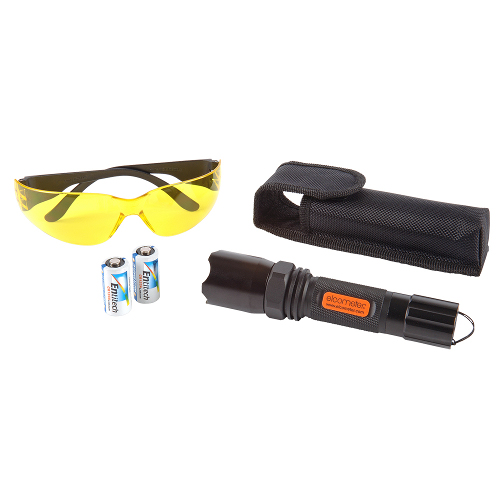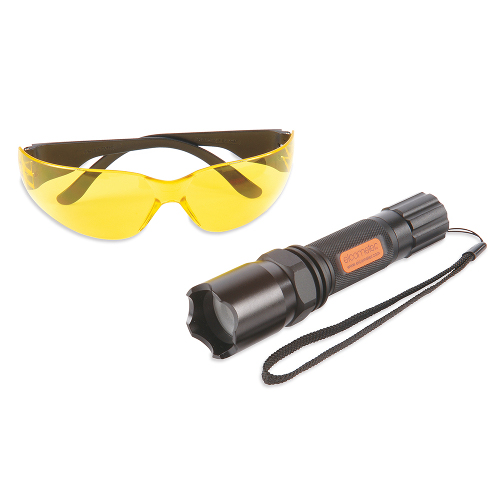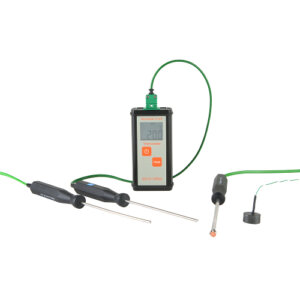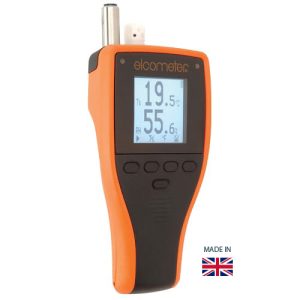The Elcometer 260 UV Pinhole Flashlight is battery powered and housed in a rugged aluminium case providing a quick, low cost method of testing coatings for pinholes.
Featuring a single Watt purple light emitting diode, the Elcometer 260 UV Pinhole Flashlight has a beam wavelength of 405nm (±5nm), which the human eye perceives as a purple light.
Pinhole detection is essential to monitor the integrity of the protective coating from its initial application to the end of its service life. Pinholes are caused by air entrapment, which is then released from the surface, or by the entrapment of particulates (dust, sand etc.) which do not stay in place. Elcometer offers a range of Pinhole Detectors from the low cost UV Pinhole Detector Flashlight to the full Pinhole Detector Inspectors Kit.
A UV reflective additive is applied to the base coat. The UV flashlight shines the purple light on the coating, the base coat fluoresces where it is not covered by any subsequent coating – identifying any pinholes in the top coat.
- Low cost and easy to use:
Use UV reflecting base coat and shine the purple light onto the surface. Any fluorescence identifies pinholes. - Rugged:
Manufactured from aluminium alloy and Oring sealed to protect it from moisture and dust. - Portable and secure:
Battery powered and features a click-on/push off button with lockout tail cap to prevent accidental activation during transport or storage.
| Technical Specifications – Elcometer 260 UV Pinhole Flashlight | |
| Part Number | Description |
| Lens Type | Dual-Element Diffuser |
| Power Output | 1 watt |
| Beam Wavelength | 405nm ±5nm |
| Flashlight Casing | Hard anodised aluminium |
| Battery Type | 2 x CR123A Lithium Batteries |
| Battery Life | 6 hours (continuous use) |
| Dimensions | 150mm x 35mm (5.9″ x 1.4″) |
| Weight | 173g (6.1oz) |
| Packing List | Elcometer 260 UV Pinhole Flashlight, UV protective glasses, nylon belt holster, 2 x CR123A Lithium Batteries and operating instructions |
Download Data Sheet
Download Instruction Manual
Standards
Can be used in accordance with:
ASTM E 2501
The Elcometer 260 UV Pinhole Flashlight is battery powered and housed in a rugged aluminium case providing a quick, low cost method of testing coatings for pinholes.
Featuring a single Watt purple light emitting diode, the Elcometer 260 UV Pinhole Flashlight has a beam wavelength of 405nm (±5nm), which the human eye perceives as a purple light.
Pinhole detection is essential to monitor the integrity of the protective coating from its initial application to the end of its service life. Pinholes are caused by air entrapment, which is then released from the surface, or by the entrapment of particulates (dust, sand etc.) which do not stay in place. Elcometer offers a range of Pinhole Detectors from the low cost UV Pinhole Detector Flashlight to the full Pinhole Detector Inspectors Kit.
A UV reflective additive is applied to the base coat. The UV flashlight shines the purple light on the coating, the base coat fluoresces where it is not covered by any subsequent coating – identifying any pinholes in the top coat.
- Low cost and easy to use:
Use UV reflecting base coat and shine the purple light onto the surface. Any fluorescence identifies pinholes. - Rugged:
Manufactured from aluminium alloy and Oring sealed to protect it from moisture and dust. - Portable and secure:
Battery powered and features a click-on/push off button with lockout tail cap to prevent accidental activation during transport or storage.
| Technical Specifications – Elcometer 260 UV Pinhole Flashlight | |
| Part Number | Description |
| Lens Type | Dual-Element Diffuser |
| Power Output | 1 watt |
| Beam Wavelength | 405nm ±5nm |
| Flashlight Casing | Hard anodised aluminium |
| Battery Type | 2 x CR123A Lithium Batteries |
| Battery Life | 6 hours (continuous use) |
| Dimensions | 150mm x 35mm (5.9″ x 1.4″) |
| Weight | 173g (6.1oz) |
| Packing List | Elcometer 260 UV Pinhole Flashlight, UV protective glasses, nylon belt holster, 2 x CR123A Lithium Batteries and operating instructions |
Download Data Sheet
Download Instruction Manual
Standards
Can be used in accordance with:
ASTM E 2501

 0 items
0 items





